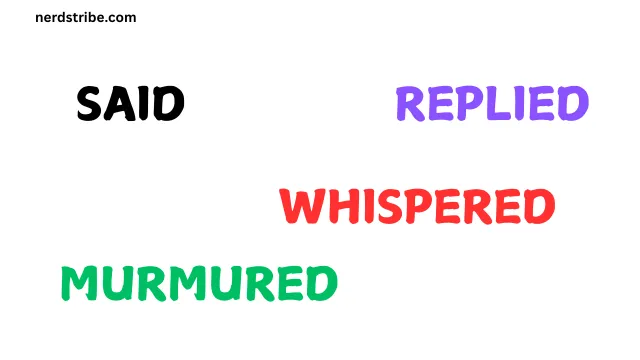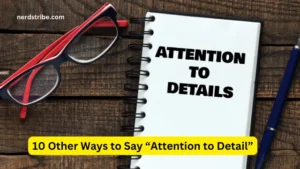Have you ever noticed how certain words, when used too often, begin to lose their impact? Take “said” for example—a word that, while essential in dialogue, can quickly become repetitive if overused.
As writers, we have a powerful tool in our hands: language. The way we craft our characters’ words shapes the entire atmosphere of a scene, and that means even the simplest words can make a world of difference.
Changing how we use “said” can add depth, tone, and even emotion to our writing, allowing each character’s voice to truly shine. In this blog post, we’ll explore why using a variety of alternatives to “said” can significantly enhance your writing.
You don’t need to rely on the same old verb to convey every piece of dialogue. By selecting the right synonyms, you can subtly influence the mood, tone, and dynamic of the conversation, helping readers feel more connected to the story. These small tweaks can elevate your writing, making it more engaging and natural.
So, why is this so important? As writers, we aim to captivate our readers, keep them immersed in the story, and give life to our characters. Using diverse verbs not only improves the flow of the narrative but also highlights the emotions and intentions behind the words.
Let’s dive into 10 alternative ways to say “said” that will bring your dialogue to the next level.

Contents
- 1 1. “Declared”
- 2 2. “Announced”
- 3 3. “Explained”
- 4 4. “Whispered”
- 5 5. “Shouted”
- 6 6. “Muttered”
- 7 7. “Asserted”
- 8 8. “Replied”
- 9 9. “Cried”
- 10 10. “Demanded”
- 11 Conclusion
- 12 FAQs
- 12.1 Why should I avoid using “said” repeatedly?
- 12.2 Can these alternative words be used in every context?
- 12.3 How do I choose the right word for dialogue?
- 12.4 Should I use these alternatives in all my writing?
- 12.5 Can I use multiple alternatives in one scene?
- 12.6 Do I need to worry about the pacing when using alternatives?
1. “Declared”
- Meaning: To state something emphatically and with authority.
- Example: “The CEO declared that the company would be shifting its focus to international markets.”
2. “Announced”
- Meaning: To make something known publicly or officially.
- Example: “She announced the arrival of a new team member to everyone in the meeting.”
3. “Explained”
- Meaning: To provide clarity or detailed information.
- Example: “The professor explained the complex theory with patience and clarity.”
4. “Whispered”
- Meaning: To speak softly, often in secrecy or intimacy.
- Example: “He whispered, ‘I think there’s someone behind us.’”
5. “Shouted”
- Meaning: To speak loudly and forcefully, often due to anger or excitement.
- Example: “She shouted across the room, ‘Watch out!’”

6. “Muttered”
- Meaning: To speak quietly and unclearly, often in frustration.
- Example: “He muttered, ‘I told you not to do that.’”
7. “Asserted”
- Meaning: To state something confidently or firmly.
- Example: “She asserted her position with unwavering confidence.”
8. “Replied”
- Meaning: To respond to someone’s statement or question.
- Example: “He replied, ‘I’m not sure about that.’”
9. “Cried”
- Meaning: To say something loudly or urgently, often due to surprise or distress.
- Example: “She cried, ‘Look out for the car!’”
10. “Demanded”
- Meaning: To request or insist on something forcefully.
- Example: “He demanded, ‘Give me the answers now!’”
Conclusion
Incorporating alternative verbs to replace “said” is more than just a way to avoid repetition—it’s an opportunity to breathe life into your dialogue. The right choice of words adds texture, emotion, and meaning to the conversation, making it feel more dynamic and reflective of the characters’ personalities and the situation.
By varying your vocabulary and choosing words that align with the tone of the dialogue, you can improve the overall flow and impact of your writing. It’s about finding the perfect balance between clarity and creativity. The next time you sit down to write, experiment with some of these alternatives and watch your characters’ conversations come to life in a whole new way.
FAQs
Why should I avoid using “said” repeatedly?
Overusing “said” can make your dialogue sound monotonous and flat. Using a variety of verbs can help express different emotions and tones more effectively.
Can these alternative words be used in every context?
Not always. Some alternatives like “shouted” or “whispered” may only work in specific situations where the tone and volume of speech are important.
How do I choose the right word for dialogue?
Consider the emotion, intensity, and context of the conversation. Select a word that reflects how the character feels or the nature of the interaction.
Should I use these alternatives in all my writing?
While these alternatives can elevate your dialogue, it’s essential to use them sparingly to maintain balance and avoid overwhelming the reader with constant shifts in tone.
Can I use multiple alternatives in one scene?
Yes! In fact, using different words for different characters or moments in the scene can add variety and enhance the overall atmosphere.
Do I need to worry about the pacing when using alternatives?
Absolutely. Some words, like “whispered” or “shouted,” can influence the pacing of the dialogue. Make sure to use them to match the rhythm of the scene.








